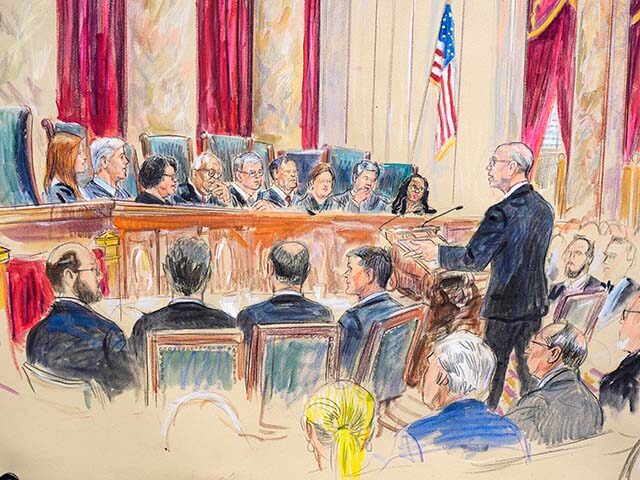WASHINGTON, DC – Justice Samuel Alito sparred with a government lawyer Thursday during oral arguments in which a majority of Supreme Court justices sympathized with former President Donald Trump’s attorneys’ arguments that a president does enjoy some level of immunity that endures past the term of office.
Alito pressed the government’s lawyer Michael Dreeben on its claim that a former president does not have any form of immunity. Dreeben represented Special Counsel Jack Smith’s team in arguing against Trump’s claim that he is immune from prosecution on charges of attempting to overturn the results of the 2020 election.
As Alito phrased it, Dreeben claims that while a former president does not have immunity, he enjoys “a form of special protection, namely, that statutes that are applicable to everybody must be interpreted differently under some circumstances when they are applied to a former president.”
Dreeben agreed, attributing it to “the general principle that courts construe statutes to avoid serious constitutional questions. And that has been the longstanding practice of the Office of Legal Counsel (OLC) in the Department of Justice.”
Alito questioned Dreeben’s assertion that courts would avoid prosecuting former presidents as well as if that protection was truly a protection at all:
All right. So this is more, I think, than just a quarrel about terminology, whether what the former president gets is some form of immunity or some form of special protection because it involves this difference, which I’m sure you’re very well aware of.
If it’s just a form of special protection, in other words, statutes will be interpreted differently as applied to a former president, then that is something that has to be litigated at trial. The former president can make a motion to dismiss and may cite OLC opinions, and the district court may say: Well, that’s fine, I’m not bound by OLC and I interpret it differently, so let’s go to trial.
And then there has to be a trial, the former president may be unable to engage in other activities that the former president would want to engage in. And then the outcome is dependent on the jury, the instructions to the jury and how the jury returns a verdict, and then it has to be taken up on appeal.
So the protection is greatly diluted if you take the form — if it takes the form that you have proposed. Now why is that better?
“It’s better because it’s more balanced,” Dreeben answered.
Alito also referenced “the old saw about indicting a ham sandwich,” a quip conveying that some district attorneys have so much influence on grand juries that they could get them to indict a ham sandwich.
The case is Trump v. United States, No. 23-939 in the Supreme Court of the United States.
Bradley Jaye is a Capitol Hill Correspondent for Breitbart News. Follow him on X/Twitter at @BradleyAJaye.

COMMENTS
Please let us know if you're having issues with commenting.